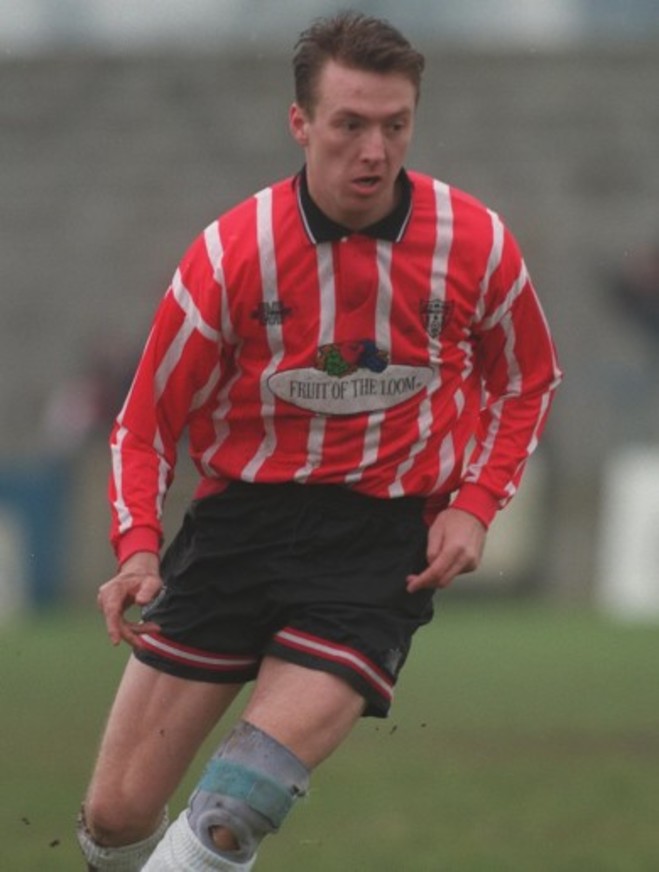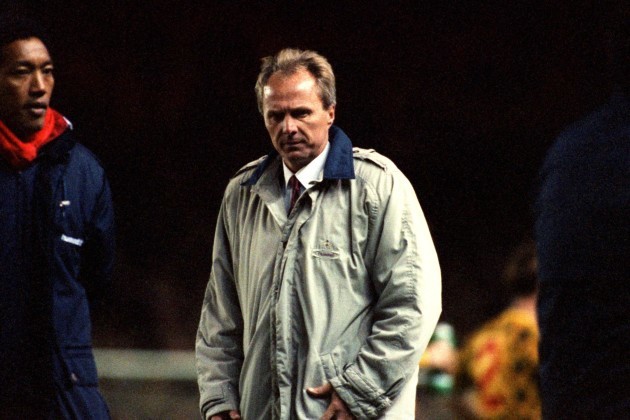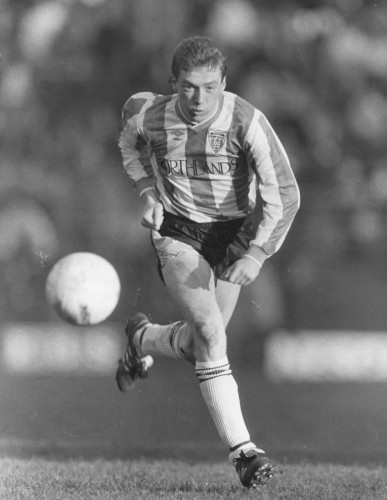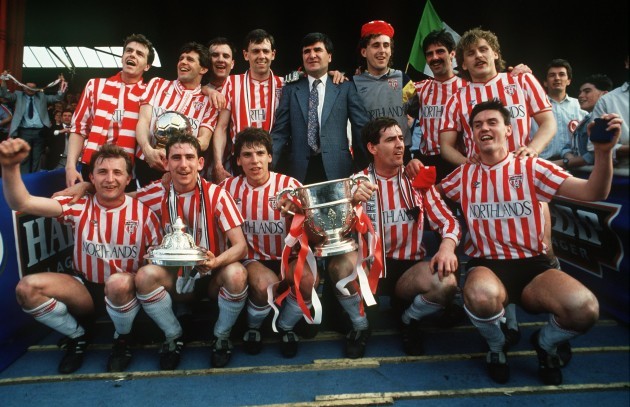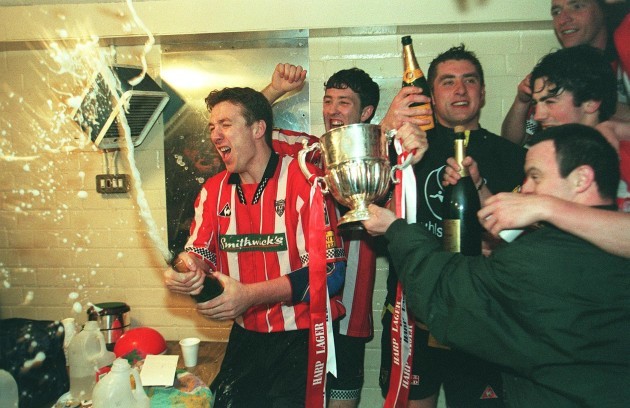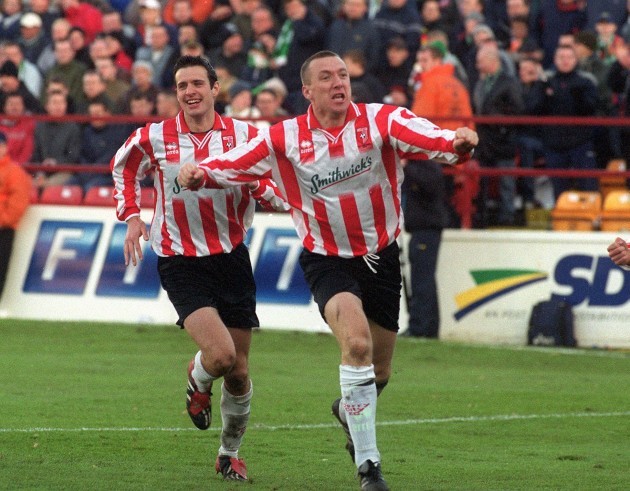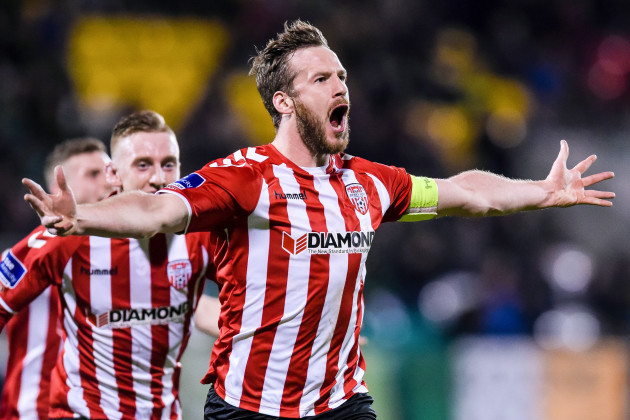THE DATE IS 13 September, 1989, and Liam Coyle appears to have the world at his feet.
At a jam-packed Brandywell, treble-winners Derry City host Sven-Goran Eriksson’s Benfica in the first round of the European Cup and several interested parties will be paying close attention to a certain 21-year-old forward.
In his first season with the Candystripes a year earlier, local lad Coyle had burst onto the scene with a hat-trick on his league debut and never looked back after that — winning PFAI Young Player of the Year for his displays as they claimed the league title, FAI Cup and league cup.
An international debut for Northern Ireland followed that summer in a friendly with Chile at Windsor Park.
The likes of Manchester United, Celtic and latest opponents Benfica are all believed to be among the list of clubs keen on securing his signature, and a fine performance in the first leg doesn’t do his chances of earning a big move any harm.
Derry go down 2-1 to the Portuguese champions but, for large spells, matched a side that included Brazilian World Cup 1994 winner Aldair and three players that featured on the losing side in the 1988 European Cup final.
Coyle has a hand in Paul Carlyle’s goal that halves the deficit 16 minutes from time and is relishing another opportunity to impress in the return leg.
Sadly, events during a league match away to Dundalk days later would rob him of that chance and dramatically change the trajectory of his career.
Brought up a stone’s throw away from the Brandywell the son of ex-Northern Ireland striker Fay Coyle, it came as little surprise that Liam would choose a similar path.
His father, who passed away in 2007, had enjoyed a distinguished career with Derry City and Coleraine and earned a move to Nottingham Forest but returned after a handful of appearances due to homesickness.
He also played at the 1958 World Cup alongside the likes of Harry Gregg, Danny Blanchflower and Billy Bingham in a team that reached the quarter-finals in Sweden.
Liam took an interest in the game from an early age but, as he explains, his dad was never the type to force him into it.
“I came from just beside the Brandywell and there were few other things to do than play football,” Coyle tells The42. “It was the height of the troubles so that was an escape really. My father was an ex-player who played in the World Cup in 1958 so football was in the family.
“He was and he wasn’t [a big influence on my career]. My father just let me get on with it. He was always there in the background, you knew who he was and what he had done, but he never really pushed me or anything like that.
When I asked him about it in later years, he said ‘I never had to push you because you had that ability’. He was good that way in that he was the complete opposite of a pushy parent.”
It soon became apparent that Liam possessed more talent than your average footballer. He remembers being asked to play street football with the bigger boys, who would occasionally give him money if he nutmegged someone or scored a goal.
Derry City had withdrawn from the Irish League in 1972 after they were forced to play home matches in Coleraine and it would be 13 years in the wilderness until they were admitted to the League of Ireland.
So the Brandywell lay idle for much of that time, but Coyle does recall going to see local league matches and watching his brother play in finals at the venue during that period.
He had signed for Brandywell Harps and represented them in an U13 tournament that a number of scouts were attending. Harps won the competition and Nottingham Forest — his father’s old club — offered Coyle a trial.
Between the ages of 13 and 16, there was spell where he would go over for a week at a time during school holidays. When it was made a more permanent arrangement, things didn’t last very long.
“They took me over for a year on the YTS [Youth Training Scheme] but I only stayed for a month after injuring my back,” he explains. “I was quite homesick at the time and went home due to the injury. I just said ‘I’m never going back, it’s not for me’ after that.”
Returning to play for Brandywell Harps’ U17s, he received a house visit from Shamrock Rovers boss Jim McLaughlin, who was in talks to join Derry City’s backroom team under manager Noel King. McLaughlin was an old friend of Liam’s dad and said he wanted the teenager to come with him — either to the Candystripes or down to Dublin to sign for the Hoops.
Coyle agreed and joined Derry, but stayed just three or fourth months as he “didn’t get on with Kinger at the time”. After a brief stint back playing junior football and appearing in the local summer cups, Finn Harps came calling and gave him his first taste of playing League of Ireland football — albeit in the First Division.
“I had a really good year and it taught me a lot about senior football in Ireland,” Coyle recalls. “It wasn’t all glitz and glamour in comparison to Derry but I enjoyed it.”
Still an amateur at this time, he turned down the offer of a contract from Harps. Having taken over from King at Derry, McLaughlin came knocking a second time and convinced him to give it a another crack with the Foylesiders. It took him a couple of months to break into the first team, but Coyle’s career was about to take off.
“I was playing well in the reserves and scoring a lot of goals but in that time there were only two subs. So you were fighting against a lot of good players.
“Jim had brought four or five fellas from Rovers with him — Paul Doolin, Mick Neville, Noel Larkin, John Coady and Kevin Brady — and then you had all the Derry boys who were there so it was a really strong side and I struggled to get into it.”
After a couple of appearances in friendlies and the Ulster Tyre Cup, McLaughlin called him up to the first-team squad for a league fixture against Cobh Ramblers in November 1988.
Coyle didn’t expect to play that day, but when the chance arrived midway through the first half, he grabbed it with both hands.
“Jim told me I was on the bench and I thought I was just going to go and get some experience with the first-team squad,” he says.
“After 25 minutes, Larko’s hamstring went and he threw me on. In the second half, I scored a hat-trick.
“It was unbelievable. If you score one, that’s a decent debut. Then you get two and you’re thinking ‘Jesus, this is going better than I thought’ and then I score a third just before the end of the match!”
Those three goals on his league debut instantly endeared him to Derry fans, and the club would go on to win an unprecedented treble. With Coyle picking up PFAI Young Player of the Year, it’s undoubtedly a career highlight.
That season just went unbelievably well for me,” he adds. “We won the treble and it all just seemed to happen for me at the right time. It was one of the best years I had in football.
“I was playing with a lot of good players and that was a big help.”
But what was it about that side that made them special?
“It was such an experienced team. You had the likes of myself, Paul Curran and Paul Carlyle, who were locals and pretty young. The other two had a fair bit of experience as they were playing two or three years, but I had never played.
“Then throw into the mix Felix Healy, who for me was the best player I ever played with. At that time, he was around 32-33 and he was unbelievable. Him and Doolin were scoring 15-16 goals from midfield. In fact, I think every outfield player scored that season.
“That’s the kind of team it was and we also had Johnny Speak and Noel Larkin as well. They really helped me. Usually when players are trying to take your place, there’s no love lost but those two really took me under their wing. I think it was just a special team and Jim never really gets the credit he deserves for it.”
Coyle’s progression into one of the finest young talents in the country hadn’t gone unnoticed and he was included in the Northern Ireland squad that May.
He admits he wasn’t that pushed to go for a number of reasons, but took the advice of his managersand turned up for the friendly meeting with Chile at Windsor Park.
“I was dying with a flu that week and I wasn’t going to go,” he explains. “I didn’t drive at the time either so that was putting me off going to Belfast. There was a lot of stuff going on with playing for Northern Ireland as a Catholic and that. That put me off as well.
“Jim [McLaughlin] and Felix [Healy] told me ‘you’ve got to go up and even if you don’t play, just show your face and be diplomatic’.”
The game was played on the same evening that Michael Thomas’ famous goal handed Arsenal the English First Division title at Anfield, and that may have been partly to blame for an attendance of a couple of thousand.
Coyle came on for Jimmy Quinn after 64 minutes, and should have scored in the closing moments but Chile won out 1-0 winners. He has spoken in the past about being subjected to sectarian abuse but, looking back now, his stance appears to have softened.
“At the time, Linfield were the major team in the North and there were a load of their supporters there. I don’t think it was a big crowd and there was some stuff said because I was from Derry.
“There was more made out of it than it actually was. When I spoke about it years ago, people read too much into it. It was the usual name-calling and stuff like that, but that didn’t affect me.”
As fate would have it, Coyle’s international career began and ended that evening. He’s thankful for the experience, but understandably a little disappointed it didn’t amount to more.
“I’m really glad I went up as I met so many good people out of it like Mal Donaghy, Alan McDonald, David McCreery and Jim Magilton who were all coming through at that time as well.
“My father went up to the match and he was waiting for me after it. He was as proud as punch to see me playing for Northern Ireland.
It was just unfortunate there were no more caps after that.”
Back at Derry, the club was handed a tough draw in the first round of the European Cup. Benfica had been beaten finalists in 1988, and were now under the guidance of future England manager Eriksson, who had won the Uefa Cup with IFK Göteborg.
Coyle still has fond memories of that first leg in Derry.
“It was a great day,” he remembers. “I think it was the first European match ever shown live on RTÉ. There were around 12,000-13,000 at the Brandywell and the atmosphere was unbelievable.
“That Benfica team was crammed full of international players and world stars but we actually should have beat them. We gave away two really poor goals. I had a good game and I really enjoyed it.”
The interest from abroad around that time was real and it looked like he was set to join one of European football’s top clubs.
“As a football you’re always trying to better yourself,” he says. “For about a year there was talk that there were clubs after me but nobody had made a concrete offer. I think a few clubs had put money down but it wasn’t enough for Derry.
So I was ready to leave but Jim [McLaughlin] was reluctant to send me to England because he thought that European football would’ve suited me better. At that time, English football was big and physical.
“From what I’m led to believe, Benfica were preparing to make a bid after the away game and the deal could have been done but in the meantime I got an injury in Dundalk.”
After playing Benfica on the Wednesday, there was a trip to Oriel Park that weekend. Around 10 minutes in, Coyle broke from the halfway line and was cleaned out by Lilywhites defender Peter Eccles.
Remarkably, he played on for most of the game but felt the knee give away late in the second half and knew then there was something wrong.
With Coyle sidelined, Benfica thumped Derry 4-0 in the second leg and went all the way to the final — where they lost 1-0 to Milan thanks to Frank Rijkaard’s second-half winner.
The swelling wasn’t going down and he was sent for an X-ray. A shadow showed up on the knee so it was off to one of the top surgeons in England.
There, it was discovered that he had a joint condition called osteochondritis dissecans, and the experts advised Coyle to stop playing football immediately. He was just 21.
“When you get injured, you don’t think it’s anything that serious and I believed I’d be over it in a couple of weeks,” he says, when asked how it felt to hear such heartbreaking news.
“I just couldn’t take in what they were telling me. I was 21 at the time and you’re sitting down with doctors and surgeons and they’re saying you’re going to end up in a wheelchair if you continue to play.
It was worse for my mother and father, because they were devastated — especially my mother who just loved me playing football. That was hard for her to hear it.
“It wasn’t like nowadays when you have all the supports to help you through it, you just have to do it yourself.”
Robbed of the sport he loved, Coyle began to drink heavily. They were dark days, and he admits having thoughts about taking his own life at one stage but doesn’t believe he would ever have acted on them.
“I was going through what you would call depression now,” he says. “Looking back on it, that’s what it was. I couldn’t function properly and I was struggling with life in general after I left Derry.
“I was still young and learning about life, and there were thoughts going through my head. When I spoke about this a couple of years ago, I think people latched onto stuff that wasn’t as bad as they thought.
“I’m sure everybody thinks ‘Jesus, life’s not worth living’ at times when you’re going through a rough patch.
“Thankfully, I overcame that and moved on but they were difficult times.”
After going under the knife a second time, Coyle went against the medical advice and decided he would attempt to do some light work that hopefully wouldn’t aggravate the injury.
“My knee went again so I had to go in for another operation and I was just sitting there with no money or nothing.
“After that, I just thought I’d try to play a bit of indoor football. I ended up getting a bit of fitness back and playing with my local team Brandywell Harps.
“Then I was playing in a summer cup down in Buncrana. There were half-a-dozen Irish League managers there and I was playing against boys who were playing Irish League and I absolutely fucking tore them to shreds.
“The next thing I know, they were all looking to sign me. That’s how I got back into senior football again.”
Coyle was never the type to put a big emphasis on training anyway, so he was content to be just back playing with his mates. But, with offers on the table and the promise that he could be ‘making a few pound’, he joined Omagh Town for the 1992/93 season.
Now sporting heavy strapping on the left knee, he made a return to competitive football two years after being told he’d never play again. Coyle put in some fine performances in the Irish League during that campaign and bids came in from Glentoran and Derry City at the end of it.
Taking the advice of his mother and his future wife, who he had just started seeing at the time, the forward opted to rejoin his former club.
There, Tony O’Doherty soon took over from manager Roy Coyle, before Felix Healy was handed the job in December 1994. That sparked a revival as the Candstripes won the FAI Cup that year but were pipped to the title by Dundalk.
The personal comeback appeared complete as Coyle was awarded PFAI Player of the Year.
I had matured as a player and I was getting fitter, so I thought to myself that I was hitting my peak.”
But he was on the move again, as Healy accepted a then record Irish League fee of £37,000 from Glentoran.
“I wasn’t happy,” he admits. “At that time, my relationship with Felix had broken down. We weren’t getting on and Felix was looking to change the team and go a different way so I was the one they were going to make money out of.
“I went up and won the Irish Cup with Glentoran. I wouldn’t say it was the happiest time in my career but we won a trophy. I was glad that Derry brought me back and me and Felix sorted our differences out.
It was always uneasy between us when I came back and we kept it more professional than anything else.”
Coyle spent just one year at Glentoran before patching things up with Healy in 1996. Bringing him back proved a smart decision on the club’s part as they won the title that season, only missing out on the double with defeat to Shelbourne in the FAI Cup final.
Never the quickest of players, it was his speed-of-thought and vision to find the run of a team-mates that set him apart. There were the spectacular goals [the screamer in Athlone stands out] and his genius — playing in a deep role behind the main striker — was often well worth the admittance fee.
Over the six years that followed, Coyle cemented his place among the League of Ireland’s all-time greats.
“When I came back and we won the league, it was great and then Felix left and Kevin McMahon took over as manager. For three or four years, I played some of my best football. My game had changed and there were a lot of young players around me.
“I really enjoyed that. We didn’t get close to winning the league but we won the cup for Kevin and he was one of the best managers I ever played for. He understood me and the way I played.
“Considering we didn’t have the biggest budget or the biggest squad we did well for ourselves, and we won both the FAI Cup and the league cup.”
By December 2003, Coyle’s body had given in and he knew it was time to hang up the boots. His parting gift to Derry was the winner in a promotion/relegation play-off against Finn Harps — his 112th and final goal in a Candystripes shirt.
After a scoreless draw in the first leg, Mark Farren’s opener looked like it was going to settle the return tie at the Brandywell. Coyle was brought on as an 89th-minute substitute and thought he would just have to run the clock down for the final seconds.
However, Kevin McHugh had other ideas and struck an equaliser for Harps five minutes into additional time. Another half hour of football was needed to separate the rivals, and Coyle was the one to eventually do it.
I really enjoyed my time up until the last year when I picked up a lot of injuries,” he recalls. “My legs had gone and I was just getting injury after injury so I decided that’s it now — the footballing Gods are calling me in.
“The Finn Harps play-off was my last match. It was one of Mark Farren’s first games for Derry — God rest him — and I went on for him late in the game.
“I was told to hold the ball in the corner but I had a bad injury myself at the time and there were only a couple of minutes to go.
“I had the ball for about five minutes but then Harps broke away and scored to make it 1-1. So I turned around and said ‘I’m never going to last this’, but I ended up scoring the winner and decided after the game ‘that’s me finished’.
He took up a role as Derry’s chief scout directly after retiring but has since moved into commentary work with BBC Radio Foyle.
“Seven years ago, they asked me to come in and do commentary on the games. It keeps me involved with the club without going down the coaching role, because that’s hard work. I’ve lost the interest to go back in and coach but I’m still around the club.”
The 48-year-old also gets to meet up with old team-mates to play on the legends team in occasional charity matches at the Brandywell.
When I recently asked Paul Osam who the best player he played against was for a similar interview, Coyle’s name was top of the list. And you’d imagine that’s the case with quite a few players from that era.
“There are too many to mention,” is Coyle’s response to the same question. “At that time, every club you came up against had four or five players. I don’t think it’s like that nowadays — there are maybe one or two.
“I would say big Oso, he was one of the outstanding players to play League of Ireland. He started on the left wing then went into midfield for that great St Pat’s team. There were people like Paul Doolin and Mick Neville, who played with Rovers and with me at Derry.
“Down in Cork, you had [Pat] Morley and [John] Caulfield up front. Stephen Geoghegan, and Vinny Arkins too. The list goes on.
“Then when I was getting older, Glen Crowe and players like that came through. There were some smashing players and it was a really tough league.
“I came on the scene in 1988 until 2003, and there were so many good teams. Six or seven clubs could win the league, now it’s maybe two. That’s the thing about the league that frustrates me, there’s not the same competitiveness.”
After Mark Farren’s passing last year and Josh Daniels losing his mother, sister, brother-in-law and two nephews in the Buncrana pier tragedy, the untimely death of Derry captain Ryan McBride last month was the latest heartbreak to hit the club and the Irish football community as a whole.
Coyle, a close family friend of the McBrides, was understandably devastated to hear that the 27-year-old defender’s life had been cut shot.
“It hit me hard because I’m good friends with Ryan’s father,” he says. “Derry is such a close community football-wise, everybody knows each other and connects with the club in some respects.
“It was so tragic. Derry were playing some of their best football and I think people are still coming to terms with it. You can see that in their slump in form.”
The family asked Coyle to join the board of the newly-formed Ryan McBride Foundation, which aims to help young, local footballers in the North West, and he was delighted to accept the offer.
“Hopefully that will help them through it as well,” he adds. “There’s a lot of support and goodwill towards them so I hope that in time it will become a bit easier.”
The42 is on Instagram! Tap the button below on your phone to follow us!
